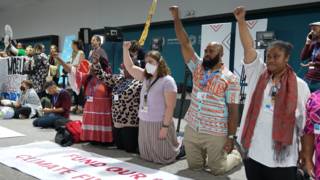HeadlinesMarch 07, 2016
Sanders Wins 3 of 4 States in Weekend Contests; Clinton Still Has More Delegates
The race for the Democratic nomination intensified this weekend as Vermont Senator Bernie Sanders beat Hillary Clinton at caucuses in Maine, Kansas and Nebraska. But Clinton easily won in Louisiana. So far Clinton has won 658 delegates to Sanders’ 471 during the first 19 primaries and caucuses. In addition, Clinton has secured an overwhelming number of unelected superdelegates made up from the party establishment. Clinton and Sanders sparred during a debate in Flint, Michigan, Sunday night; we’ll have excerpts after headlines.
Ted Cruz Wins Kansas, Maine; Trump Takes Louisiana, Kentucky
On the Republican side, Texas Senator Ted Cruz defeated front-runner Donald Trump in the Kansas and Maine caucuses, while Trump won in Louisiana and Kentucky. Trump called for Florida Senator Marco Rubio to drop out of the race, saying he wanted to take on Cruz one on one. But Rubio won the primary in Puerto Rico, sweeping all 23 delegates. Retired neurosurgeon Ben Carson meanwhile has suspended his campaign. And Ohio Governor John Kasich has picked up the endorsement of actor and former California Governor Arnold Schwarzenegger, who is set to replace Donald Trump on the reality TV show “The Apprentice.” As the Republican establishment seeks to block Trump from taking the nomination, one possible strategy is for Rubio and Kasich to remain in the race, dividing the delegates in the hopes of producing a brokered convention. Meanwhile, outside groups are reportedly gearing up to spend millions of dollars on anti-Trump attack adds in Florida and Illinois ahead of key contests there.
Trump Vows to Broaden Laws on Torture
Speaking in Florida over the weekend, Trump said he would broaden laws on torture.
Donald Trump: “We’re going to rebuild our military. We’re going to knock out ISIS so violently and so fast. They chop off heads. They do things that we haven’t seen since medieval times, and we’re worried about waterboarding. So here, very—wait, wait, wait. Sit down. Sit down. Let me just tell you. OK? Excuse me. So I want to stay within the laws, and right now we have the laws, but I want to make those laws stronger so that we can better compete with a vicious group of animals, OK?”
Turkish Authorities Seize Zaman, Country’s Largest Newspaper
Turkey’s largest newspaper has been taken over by the authorities. On Friday, Turkish police raided the offices of the newspaper Zaman after a court ruling put the newspaper under state control without giving any reason. The next day, as thousands rallied to defend the newspaper, police fired rubber bullets and tear gas; dozens reportedly collapsed after being overcome by the gas. Sunday’s edition of the newspaper featured a new propagandistic, pro-government line, while former Zaman staff launched a new paper of their own. Zaman’s former editor-in-chief Abdülhamit Bilici, who was fired in the takeover, said it was a dark period for Turkey.
Abdülhamit Bilici: “Unfortunately, it has been a habit for the last three, four years that anyone who is speaking against the government policies is facing either court cases or prison or such control by the government. And I think this is a dark period for our country, for our democracy. But I don’t think that this dark period will continue. It cannot be sustained, and it cannot be continued.”
Turkish Women Defy Ban, Rubber Bullets to Rally for Gender Equality
Meanwhile, hundreds of women gathered in Istanbul, defying a ban, to rally for gender equality ahead of Tuesday’s International Women’s Day. Riot police fired rubber bullets to disperse the crowd, but protester Guris Özen said women would not back down.
Guris Özen: “We have always said that we would never leave the streets for the March 8 demonstrations, and we never will. Neither the police nor the government can stop us. You see the power of women. We are here despite every obstacle, and we will continue to fight for our cause.”
Turkey Meets with EU Leaders on Refugee Crisis; 25 People Drown
The repression in Turkey comes as the Turkish prime minister meets with European Union leaders in Brussels over the largest refugee crisis since World War II. Turkey is also seeking to advance its bid to join the European Union. On Sunday, at least 25 people drowned off the Turkish coast attempting to reach Greece. On the Greek border with Macedonia, thousands of refugees remain stranded as Macedonia has tightly restricted who can cross. A man from war-torn Aleppo, Syria, called for open borders, appealing to German Chancellor Angela Merkel.
David: “I want this door, nothing; I want this door open, this door. Merkel, Mama Merkel, I want, where are you? Mama Merkel, where are you? Where are you? I want open the door.”
Slovakia: Party with Neo-Nazi Ties Wins 14 Parliamentary Seats
In Slovakia, an extreme right-wing party has made surprising gains in the elections, picking up 14 parliamentary seats. The People’s Party-Our Slovakia is led by Marian Kotleba, known for his past ties to neo-Nazism, including his decision to wear a uniform modeled after the World War II-era militia of the Nazi-sponsored Slovak State. The party of Slovakia’s prime minister—who himself has campaigned against refugees—finished first in the polls. Slovakia takes over the presidency of the Council of the European Union in July.
Iraq: Suicide Bombing South of Baghdad Kills At Least 60
In Iraq, a suicide bomber detonated a fuel tanker laden with explosives, killing dozens of people at a checkpoint in Hilla south of Baghdad, near the site of ancient Babylonian ruins. Reuters said at least 60 people had been killed and more than 70 wounded in what it called the second deadliest suicide attack this year. ISIL has claimed responsibility. It was the third major bombing around Baghdad in just over a week.
Yemen: Civilian Casualties Mount Amid U.S.-Backed Bombing
In Yemen, gunmen attacked a nursing home founded by Mother Teresa in the southern city of Aden, killing at least 16 people, including six nuns. The violence came as the United Nations reported about twice as many civilians had been killed in Yemen in February as in the previous month, marking the highest monthly casualty toll since September. Rupert Colville, spokesperson for the Office of the U.N. High Commissioner for Human Rights, said most of the casualties came from airstrikes by the U.S.-backed, Saudi-led coalition fighting Houthi rebels.
Rupert Colville: “Civilian casualties continue to mount in Yemen. During the month of February, a total of at least 168 civilians were killed, and 193 others were injured, around two-thirds of them by coalition airstrikes.”
Average Temperature Briefly Tops 2 Degrees in New Climate Milestone
The world has reached a new climate change milestone. On Thursday, for a brief period, the average temperature in the Northern Hemisphere was more than 2 degrees Celsius above normal for the first time in recorded history. The 2-degree marker has been accepted by governments around the world as a key red line to avoid the most catastrophic impacts of global warming. This comes after February became the most unusually warm month on record—smashing the record set the month before.
Supreme Court Blocks Louisiana Anti-Choice Law, Saving Clinics for Now
In a victory for reproductive rights, the Supreme Court has temporarily blocked a Louisiana law critics say would have shut down all but one abortion clinics in the state. The law required abortion providers to obtain admitting privileges at a nearby hospital, a task many can’t achieve, in part due to anti-choice sentiment. The court said its decision was “consistent” with a prior ruling blocking part of a similar sweeping anti-choice law in Texas. The decision on Louisiana Friday came just two days after the Supreme Court heard a challenge to the Texas anti-choice law, marking the most important abortion case in a generation. A decision is expected in June.
West Virginia Passes Law Letting People Conceal Guns Without Permit
In West Virginia, the Legislature has approved a measure allowing people to carry a concealed firearm without having a permit. Lawmakers overrode a veto by Democratic Governor Earl Ray Tomblin. The measure was opposed by police but backed by the National Rifle Association.
Former First Lady Nancy Reagan Dies at 94
Former first lady Nancy Reagan, widow of President Ronald Reagan, has died from congestive heart failure at the age of 94. Reagan is perhaps best known for her ad campaign urging people to “just say no” to drugs, part of a wider escalation of the war on drugs under her husband’s presidency. Later in life, Nancy Reagan split with conservatives to become an advocate for stem cell research, after caring for her husband as he suffered from Alzheimer’s.
Honduras: Thousands Gather for Funeral of Berta Cáceres
And in Honduras, thousands of people gathered at the home of assassinated environmentalist Berta Cáceres to pay their final respects to one of the leading advocates for indigenous land rights in Honduras. Cáceres, who won the Goldman Environmental Prize last year, was gunned down at her home early Thursday. She had received repeated death threats over her opposition to mining and dam projects, including the Agua Zarca Dam. In a statement, Vermont Senator Patrick Leahy called for the dam project to be abandoned. Cáceres’ supporters, including Lesly Flores, vowed to continue her struggle.
Lesly Flores: “I’m saying goodbye to her for the last time, but the truth is that Berta hasn’t died. Berta lives on in our hearts. They haven’t actually killed Berta; they haven’t killed her. Berta is a seed that we’ve been left with. For us, that seed will germinate day after day, and we, as women, will continue the fight. We are not scared.”
Most popular
- 1
- 2
- 3
- 4
Non-commercial news needs your support
Please do your part today.











Media Options